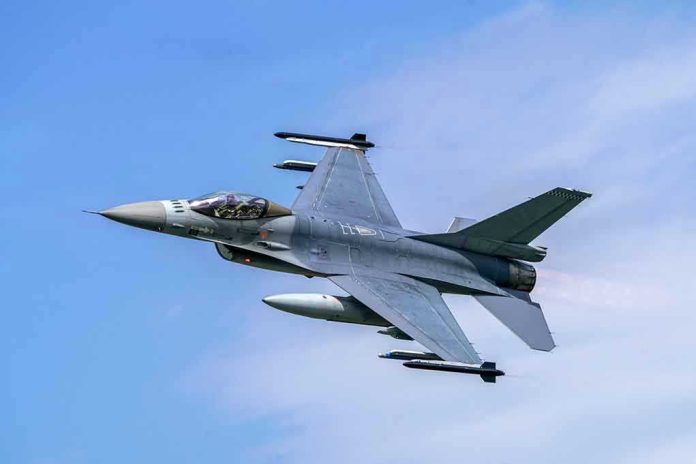
A Ukrainian Air Force officer’s betrayal exposes the fragility of Western military aid as he allegedly leaks F-16 jet locations to Russia—how deep does this espionage run?
At a Glance
- Ukrainian Air Force major arrested for spying for Russia.
- The officer leaked locations and operational details of sophisticated Western jets.
- Espionage targeted F-16s and Mirage 2000s, critical assets in Ukraine’s defense.
- The arrest raises concerns over the security of Western military support.
Espionage in the Ranks: A Major Breach of Trust
The Security Service of Ukraine (SBU) has uncovered a deeply unsettling breach within its military ranks. A Ukrainian Air Force major, an instructor pilot, stands accused of espionage, leaking sensitive information about Western-supplied F-16 and Mirage 2000 fighter jets to Russian military intelligence. This information allegedly facilitated Russian missile and drone strikes on Ukrainian air bases, a devastating blow to Ukraine’s defense capabilities. The arrest was publicly announced on July 30, 2025, highlighting the ongoing threat posed by Russian intelligence operations within Ukraine.
Ukrainian air force officer accused of leaking location of NATO F-16 jets to Russia https://t.co/TXRvZz2p6D pic.twitter.com/HXJbMPjJcz
— New York Post (@nypost) July 30, 2025
The major’s role as a flight instructor in a combat aviation brigade granted him direct access to operational planning and execution details, making this breach particularly damaging. The espionage not only involved the disclosure of aircraft locations but also included analytical reports on Ukrainian air defense tactics, aimed at aiding Russian strike planning. The betrayal emphasizes the vulnerability of Ukraine’s military infrastructure as it integrates advanced Western aircraft, requiring heightened vigilance against espionage.
Western Allies on Edge
This incident has understandably sent shockwaves through Western allies, who have been pivotal in supplying Ukraine with advanced military hardware. The security of such equipment is paramount, and any compromise could have severe implications for future military aid. The F-16s and Mirage 2000s represent a significant escalation in Western support, and their security is a top priority. If espionage within the Ukrainian military continues unchecked, it could deter future Western support, impacting Ukraine’s ability to counter Russian aggression effectively.
Western partners, including the United States and France, have a vested interest in maintaining the integrity of their military aid. The arrest of the Ukrainian officer underscores the need for robust vetting and counterintelligence measures to safeguard these critical assets. The SBU’s ability to detect and neutralize internal threats is crucial for sustaining trust with Western partners and ensuring the continued flow of military assistance.
Implications for Ukraine’s Defense Strategy
The arrest and subsequent investigation have far-reaching implications for Ukraine’s defense strategy. In the short term, there will likely be increased scrutiny and security at Ukrainian air bases, potentially disrupting air operations. The breach has already heightened mistrust within the military, necessitating stricter vetting and counterintelligence measures. Long-term, the incident could impact Western willingness to supply advanced weaponry if security concerns remain unaddressed.
For Ukraine, rooting out internal threats is a pressing challenge. The integrity of its defense community depends on addressing these vulnerabilities swiftly and decisively. The broader Ukrainian defense sector faces renewed pressure to implement comprehensive security protocols to prevent future breaches. Failure to do so could erode public trust in military leadership and security services, with broader social and political ramifications.



